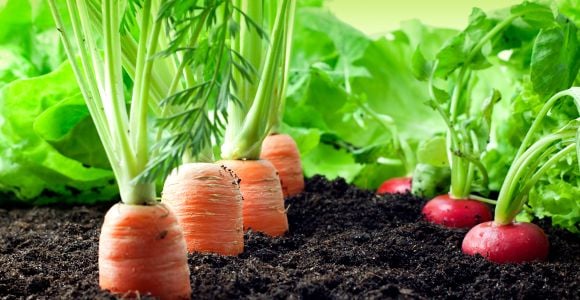The weather is finally starting to warm up, and the days are getting longer. This means it is getting closer to one of my favorite seasons, summer. Late Spring is a great time of year to test out your green thumb by starting a fruit, vegetable, and/or herb garden. Natural foods you grow on your own are almost always healthier than any packaged alternatives you can buy in the store. The part of the country or world where you live will help determine what you can grow during this time. Even if you have limited space, like a small balcony or windowsill, you can still grow many edible plants to use in your cooking.
Fruits and Vegetables
There isn't much you could eat that is better for you than a fresh fruit or vegetable. If this is your first garden, it might be easiest to start with hearty plants that can withstand a lack of constant tending. Tomatoes, for example, come in many varieties and are easy to grow almost anywhere. If you live in a city without room to garden out in the grass, you can plant tomatoes in pots fitted with a few vertical sticks or a trellis for the vines to climb. Leave outdoors or by a sunny window, and simply water every few days. In a short time, the plant should produce juicy fruits to bring some sweet and lovely flavors to summer dishes.
Other nutritious fruits and vegetables that are great for vertical planting in pots or small areas include eggplants, peppers, leaf lettuce, squash, and green beans. These are all fairly easy to maintain with just a small amount of effort. For other ideas, ask a local nursery or garden supply center for suggestions about what fruits or vegetables grow best in your area.
Herbs
Herb plants are ideal for home-growing, even in small spaces. Most varieties are fairly hardy and enjoy early morning sun, and growing your own will be much cheaper than buying plants in the store every time you need them. Fresh herbs (or dried, if you want to save some of your harvest) are perfect flavor additives that you can use in your cooking in place of salt or fat and calorie-laden dressings or seasonings. Commonly used herbs include basil, rosemary, oregano, and thyme. You can also grow lemon balm or mint to use in salads or to make tea. For best results, grow mint separate from other herbs since it tends to take over the pot.
Healthy Gardening
A great advantage of growing your own vegetables and herbs is that you know what has gone into the soil and what was used in planting. If you only use soil and water when growing the plants--no pesticides or other additives--then the vegetables you harvest will be organic. This makes organic gardening a very affordable alternative to buying expensive produce at grocery stores or farmers' markets.
Also, vegetables you buy are often picked early and left to ripen in the store or on your kitchen counter. When you garden at home, you can leave your vegetables to ripen on the plant and allow them to reach their fullest nutritional value. Not only will they taste better, but they will be healthier for you, too.
Grete R. Hornstrom is a Clinical Dietitian who is currently specializing in pediatric care. She holds a Bachelors of Science in Physical Education with a concentration in Exercise Science from Kent State University, a Master of Arts in Wellness Management from Ball State University, and a Master of Science in Dietetics from Ball State University. She has worked with overweight children and adults, recreational and elite athletes, chronically ill children, and every day people on developing nutrition plans and healthy lifestyle changes. In addition she has worked with recreational teams, high school teams, and college teams educating them on the importance of nutrition and performance. She has completed one marathon and three half marathons in the last two years. Her newest sport of choice is cycling.



